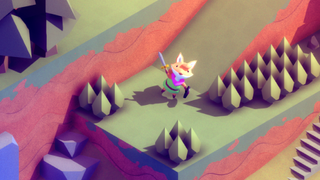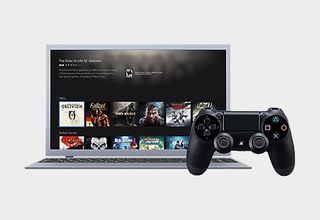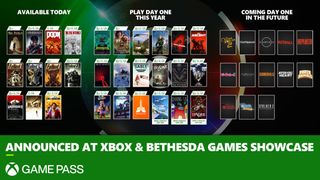Game Pass can't stay this good a deal forever
Enjoy Microsoft's subscription service while it's still so cheap—and has such a diverse library.

When Microsoft announced Game Pass in June 2017, a different monthly subscription service was blasting toward a spectacular flameout. That was MoviePass, which cut its subscription price from up to $50 to a flat $9.95 per month. Suddenly, subscribers could see a movie every single day of the month for less than the cost of a single ticket in most cities. It was blatantly too good to be true, and millions of people gleefully took advantage while MoviePass hemorrhaged money and tried to strong arm the movie industry into a deal that would save it from itself.
It was great while it lasted.
Now five years in, Microsoft's Game Pass is well past the possibility of a spectacular flameout. It's a proven success: There's no reason to worry about Game Pass shutting down anytime soon, as more than 25 million subscribers pay monthly for access to hundreds of games. If you're an active player with diverse tastes, it's the best deal in gaming.
Like MoviePass, I think Game Pass is too good to be true, too, but on a much longer timeline. It won't be a flameout. Instead the deal will get just a little bit worse as we continue to pay for a subscription that feels as universal as water or Netflix. An industry analyst recently suggested that there's little reason to worry about a future where gaming is dominated by a Netflix-like service, but I do think Game Pass could eventually mirror some of the worst aspects of Netflix's recent history.
A price jump is (almost) inevitable
Game Pass is still in its subscriber-building phase, with outright profit secondary to pulling in new users. That doesn't mean it's burning cash, though: In a November 2021 interview, Phil Spencer said Game Pass is "very sustainable as it sits today." One could argue anything is sustainable in a company worth more than $2 trillion, but let's assume Game Pass is either profitable or getting there. Microsoft will be just fine; the much more likely outcome here is that Game Pass becomes a worse deal for subscribers as time goes on.
In 2014, Netflix cost $8.99 for a standard subscription and $11.99 for premium; since then the price has increased five times, and is now up to $15.49 and $19.99. It's almost doubled in less than a decade. Inflation can't account for that: The 2014 price comes to around $11 in 2022 money, according to the US Bureau of Labor Statistics inflation calculator.
So far, Game Pass hasn't increased in price from $10, though Microsoft did add a $15 premium tier in Game Pass Ultimate, which includes Xbox Live Gold, cloud gaming, and more. But like any publicly traded company, Microsoft needs to make more money every single year, and Game Pass is a big part of its Xbox revenue. A price increase seems almost inevitable once Microsoft has enough subscribers hooked on its library.
The biggest gaming news, reviews and hardware deals
Keep up to date with the most important stories and the best deals, as picked by the PC Gamer team.
Xbox Live subscribers threw a fit when Microsoft tried to dramatically raise Xbox Live's price in early 2021, so the company quickly backtracked. Next time Microsoft will likely just raise its subscription prices like it's boiling a metaphorical frog: slow and steady, and no one gets too alarmed. The one reason Microsoft might keep Game Pass cheap is that the company gets a 30% cut of every digital purchase on Xbox—the profit of keeping more people in the ecosystem could outweigh the benefit in increasing Game Pass's price (and the inevitable loss of a few subscribers). But let's be real: Microsoft will want to make more money both ways.
The deal gets worse for developers

In Game Pass's first couple years, indie developers praised the deals Microsoft offered to get their games into the library. Their games could end up being profitable before they even came out, and Game Pass didn't seem to negatively affect how many copies they sold elsewhere. I asked an indie publisher if good deals to be included in Game Pass were still common. "The general consensus is that [Game Pass deals] are still good," they said.
Maybe that will continue to be the case for years, but it will always be in Microsoft's best interest to prioritize games that the most subscribers play. In the long run, that goal likely won't mesh with creators who make games that land outside certain demographics. It's also less likely to mean re-upping deals for games that have already spent time in the Game Pass library, versus boasting about new additions.
This has become a major point of criticism with Netflix, which aggressively cancels shows after a season or two even if they're performing well. The creator of The Baby-Sitters Club, which was canceled after two seasons despite doing "way bigger numbers" than HBO shows like Succession, said that it seems like "Netflix’s internal metrics can change month to month." Financially, it makes more sense for Netflix to kill off shows that are doing fine to spend money on a new show that could potentially drive fresh subscriptions instead.
The industry analyst who talked about Game Pass at GDC wondered if the mix of first party games and other major franchises will cause smaller games to "get increasingly squeezed" in terms of discoverability, and if "the terms of acquiring those or putting those games into [Game Pass] starts to deteriorate." With the entire output of Bethesda, Activision Blizzard, and its other first party studios on Game Pass, Microsoft could conceivably maintain a healthy subscriber base in the future without bothering with outside games at all.
Subscription wars

No one is happy with the state of streaming TV these days, with shows and movies splintered between Netflix, HBO Max, Disney+, Hulu, Amazon, Apple TV+, and (hiss) Paramount+ and Peacock. And that's even before you get into boutique streamers like Criterion and Shudder. It wasn't always like this: In the early years of streaming Netflix secured huge swathes of shows and movies for cheap because the networks didn't have streaming platforms of their own. Now NBC wants you to pay $5 per month just to watch The Office.

So far, gaming hasn't seen nearly as obnoxious a spread of subscription services, but a few publishers have dipped their toes in. Ubisoft has Ubisoft+, and EA has EA Play, which is currently also bundled with Game Pass. Sony's upcoming rival subscription program is already bad news for PC gamers, upping the cost of streaming games on PC, and it's easy to see Game Pass's growth inspiring more competition down the road from Take Two or Epic or Square Enix or Tencent or Embracer Group.
Even if the same obnoxious splintering hits gaming subscription services, it at least won't be as annoying as it is with TV & film—games are still easy to buy day one, which often isn't an option at all with Netflix shows. But there are still all sorts of potential futures where subscription services make gaming worse:
- Game Pass loses its best third party games to rival services
- Publishers require subscriptions to get early access a week before you can buy a game, like EA has done with EA Play
- "Time played" metrics encourage boring, grindy games
- More tiers pop up to gate access to big games or expansions
- "I'll wait for it to get added to a sub" starts hampering direct sales
- NFTs ruin everything, somehow
Game Pass on PC remains frustratingly limited
Game Pass has been on PC since 2019, and in that time it has gotten better—a little bit. The game selection was strong from the start, but the Xbox app used to access them presented many frustrations. It was better than the Microsoft Store, but still slow and tapped into that store as a backend. Games were packaged differently than their Steam counterparts and often had unique performance issues or other drawbacks that went unfixed.
It took until March 2022 for an Xbox app update to let us choose a custom game install folder and add mod support, but that mod support remains spotty and buried, a far cry from the dead simple modding of Steam Workshop or the hands-off simplicity of DRM-free games from GOG.

PC Game Pass's shortcomings were easier to forgive when Microsoft first launched it in beta. But the app is still bloated and clunky; it's truly bizarre that the company that makes Windows is responsible for the worst apps and not the best. Three years ago I was more optimistic that we'd see regular crossplay between Game Pass versions of PC games and Steam versions, and that Microsoft would move quickly to improve the app used to launch games. PC Game Pass has improved, but far more slowly and sporadically than I hoped.
Since 2019, meanwhile, Valve has done a lot with Steam, launching Proton for Linux compatibility, overhauling the store experience and library and download manager, creating a playtest feature for developers, and expanding remote play streaming. Its friends list and invite system remains miles ahead of Microsoft's integration of Xbox Live even though, again, Microsoft makes Windows.
This is one place where Netflix isn't a great analogue for Game Pass, but Amazon Prime Video is: Just the thought of booting up that slow, ad-filled, horrendously designed app is enough to make me want to watch something on another streaming service instead.
The analyst who recently spoke about Game Pass at the Game Developers Conference predicted that subscription services will only account for 8.4% of the total games market by 2027. Right now, they're about 4%. So it's not like gaming's near future is going to mirror TV or music streaming or share identical pitfalls—I'm certainly not worried about Game Pass eradicating game ownership. Game Pass remains an incredible deal for now, but the eventual push for more revenue and a curated library of the most broadly appealing games loom over it.
And at least on PC, I find myself less and less interested in subscribing the longer the app is simply a worse way to play games I could get on Steam. The novelty of the huge, cheap library has worn off enough for me to focus in on specific games, and I can often buy those for the price of a month's subscription, instead.

Wes has been covering games and hardware for more than 10 years, first at tech sites like The Wirecutter and Tested before joining the PC Gamer team in 2014. Wes plays a little bit of everything, but he'll always jump at the chance to cover emulation and Japanese games.
When he's not obsessively optimizing and re-optimizing a tangle of conveyor belts in Satisfactory (it's really becoming a problem), he's probably playing a 20-year-old Final Fantasy or some opaque ASCII roguelike. With a focus on writing and editing features, he seeks out personal stories and in-depth histories from the corners of PC gaming and its niche communities. 50% pizza by volume (deep dish, to be specific).
Most Popular

